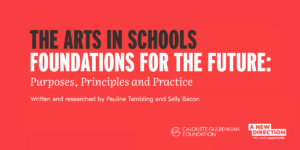A New Direction – Arts in Schools
Forty years ago the Calouste Gulbenkian Foundation UK Branch published The Arts in Schools: Principles, practice and provision. This seminal report was hugely influential with Local Authorities, which then managed the country’s schools; it paved the way for the arts to be included in England’s first National Curriculum in 1988; and inspired many professional arts organisations to engage with the education sector for the first time.
Forty years later we do not have the sustained and equitable practice and provision that The Arts in Schools envisioned. There is a growing body of international evidence asserting the value of the arts in shaping and equipping children and young people, and a range of other metrics, but this awareness has not been absorbed within our education policy and systems.
On the 40th anniversary of the 1982 report, the Foundation joined with partners to convene a new conversation on the value of the arts for young people, examining the current state of play and what we have learnt over the intervening decades. The Arts in Schools: Foundations for the Future is the culmination of a year-long consultation with education and arts professionals and policy makers. The report studies the education system in England today and provides recommendations for a reimagined system, where arts subjects are recognised for equipping children with skills for life and work. The report was led by A New Direction and researched and written by Sally Bacon and Pauline Tambling, with initial funding of £22,500 from the Foundation and matched funding from the Bridge Organisations, and additional funding of £20,000 for the design and dissemination of the final report. The project has now been transferred to Cultural Learning Alliance, who will champion the report and its recommendations for the years to come.
The Arts in Schools: Foundations for the Future report
The Arts in Schools: Foundations for the Future finds evidence of inspirational practice across the UK but highlights deep concern about the principles and provision underpinning the arts in schools. It shows that progress isn’t always linear or lasting.
The report calls for greater recognition of how the arts shape human experience and development; a reimagining of the purpose of education; and more equitable access to cultural experiences. The three key findings – which echo themes of the original Arts in Schools report – are:
- Arts subjects and experiences have an evidenced role in contributing to improving outcomes for children and young people, providing them with skills for life and skills for work.
- Despite all that we know about the value of arts subjects for children and young people, there is a lack of value ascribed to the arts within the state education system in England.
- Many of the current problems we identify are as much about the wider context in which learning takes place as about the specific challenges for the arts in schools, and there are now widespread calls for education system change: the report shows that this is necessary and possible.
The report identifies 10 principles for policy and practice to ensure ‘arts-rich’ schooling experiences:
Five core policy principles to underpin the arts in schooling:
-
- Rationale: clear purposes for schooling and a coherent vision for subject areas, with curriculum linked to purposes.
- Parity of esteem: equal status for arts subjects with other curriculum areas, within a broad and balanced curriculum.
- Including every child: an access entitlement built on inclusion and equality.
- Whole child and a rounded learning experience: educating for personal development and wellbeing, not just academic attainment.
- Education for now: educating for the importance of the present, as well as for the future.
Five core practice and provision principles essential in enabling a school to become arts-rich:
-
- Breadth: exposure to all art forms and a breadth of work and experiences.
- Balance: between knowledge and skills.
- Inclusion: embracing the needs of all children.
- Relevance: reflective of the world in which children live and will work.
- Learner voice: listening to children and young people.
Looking ahead, the report also offers 10 recommendations which can provide scaffolding for the future:
-
- A national conversation to consider and define new purposes for schooling.
- New curriculum areas.
- Changes to how we assess arts subjects.
- Creating an arts entitlement within the school day, and extra-curricular arts as additional.
- Representation and relevance.
- Teacher and learner agency.
- Improved and evidence-based case-making.
- Support for the arts in schools from the professional arts sector.
- Schools at the heart of their communities.
- Aggregating the findings of reports calling for education system change.
Roundtables
Over summer 2022, the project brought together, in a series of roundtables, education and arts leaders from across the past four decades together with young people to review, interrogate, and debate where we go from here. The roundtables delved into the wide-ranging themes of the original report – including the purpose of education and the arts, diversity and inclusion, and provision beyond schools – and the discussions will inform the writing of the final report. A series of blogposts reflecting on the roundtable discussions is being published over the next few months.
Find out more
